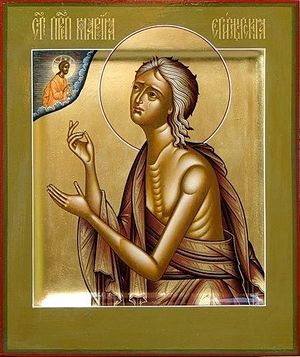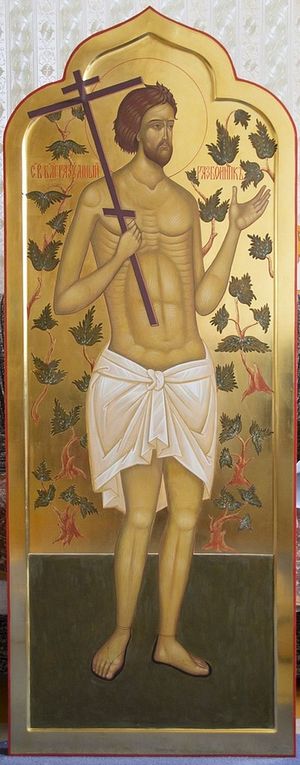A conversation with the dean of the reviving Church of the Nativity of the Most-holy Mother of God on the Nizhny Dol in Vologda, archpriest Alexander Lebedev, about the “wickedness of our days”, given to us for repentance; our so-called “ordinary” sins; the “point of no return”; and the “salvation scheme” of the wise thief.
 Fr. Alexander, soon we’ll be celebrating the memory of St. Mary of Egypt and revering the great ascetical feats of this saint. After having rejected the life of sin, she spent so many years in repentance, deprivation, and prayer! What caused her to make such sacrifices? Are such things even possible after so many years of living in sin, when the soul has become dead, when the voice of one’s conscience is almost completely stifled?
Fr. Alexander, soon we’ll be celebrating the memory of St. Mary of Egypt and revering the great ascetical feats of this saint. After having rejected the life of sin, she spent so many years in repentance, deprivation, and prayer! What caused her to make such sacrifices? Are such things even possible after so many years of living in sin, when the soul has become dead, when the voice of one’s conscience is almost completely stifled?
In my opinion, the motive behind the entire penitential part of St. Mary of Egypt’s life was a thirst for the salvation of the soul. She realized her sinfulness and did everything in order to not only not return to her former way of life, but also to pluck out of her soul the very root of her past sins—the passion of fornication. She made it her life-long goal to rid herself of this passion, to defeat it; and as one might say, she didn’t care what it would cost her. In the example of St. Mary, what’s incredible is her determination and irrevocability rather than how alive her conscience was. Perhaps it can be assumed that during her utterly sinful life she did not, however, stifle her conscience, she did not kill it. It seems that she did not even know what a conscience is and it never occurred to her that it’s possible to live some other way. But then came the moment where her conscience awoke, which is very vividly described in the account of her life. And from that point on she never disobeyed her newly obtained conscience. The majority of people, like in the time of St. Mary and likewise in our time, are located in a different spiritual reality. We have a conscience, and it’s capable of showing us what the right moral guidelines are, but often times we neglect it. And in this sense we may be less sinful than Mary of Egypt, but lack conscience. This is where the danger of our salvation lies, because God grants forgiveness based not on the gravity of the sin, but on how powerful the repentance is. And what kind of a repentance can someone with a “toothless” conscience have?
Can we with our so-called “ordinary” sins be afraid of stifling the voice of our conscience? How should we act when it comes to our “ordinary” sins?
Now this is exactly what I began talking about. The pettiness of our sins creates an illusion of their harmlessness and pushes one towards spiritual carelessness. And this is a mistake. Either a brick or a sandbag, if tied to someone’s neck, will equally drag them down to the depths. Mere sand pebbles, when put together, form a significant weight. In the same way do our “everyday” sins tend to accumulate. One shouldn’t be deceived by their lightness; in fact, the sins that we consider insignificant are the “heaviest” in terms of being able to overcome them. A person who has committed, for example, murder, then acknowledged his sin and repented of it, will not repeat it. But try overcoming condemnation, irritability, discontentment, and you’ll see that these sins desperately resist being overcome and for the most part we’re powerless against them. For years and years one carries to confession the same, standard set of sins, and little in their life changes. However, a change in life is what a sign of repentance is. “A word can be refuted by another word, but what can you refute your life with?” says St. Gregory the Theologian. And our life irrefutably testifies that our words and thoughts about repentance (I’m talking about our “everyday” sins here) are mere words and thoughts, and not real, live repentance. But if there’s no repentance, then can there be forgiveness?
How does one break this chain of habitual sins leading us to hell?
Through honest, persistent, painful attempts at getting rid of them. If each time you catch yourself committing this or that “everyday” sin, ask God for forgiveness and try not to return to it; and if each time after confession we try to hold ourselves back for as long as possible and not repeat these sins, then some small changes will start taking place in our lives. And that will already be some sort of a result. That’s already a change in our spiritual life, even if it’s not a major one. That’s no longer a hopeless state. That’s the hope of gaining victory, for God, as we know, not only accept the deeds, but honors our intentions as well. He does not wait until man traverses the entire path that separates him from God, but goes out to meet him and help him, just as in the parable of the prodigal son did the father, after being deserted by his son, ran out to meet him when he saw him from afar rather than waiting for him to get home. In order to build up such a spiritual life one needs to pay careful attention to themselves, have vigilance, and have irreconcilability with their “ordinary” sins, because they gain the upper hand over us due to the condescension we have towards them.
During every Divine Liturgy we always remember one other person who repented: the wise thief. Now he, unlike St. Mary, sinned during his entire life. But he went to Heaven with Christ, and in fact, was the first of all mortals to get there. Not bad! So what if I do the same thing? Live happily here on Earth, enjoying everything in life without denying myself anything, and then at the end, after retirement let’s say, I’ll start (so be it!) going to church, placing candles. Retirement, church, feeding the ducks at the park pond with bread, and me going around with my walking stick all repented now. Or In the worst case scenario, I’ll repent on my deathbed; maybe even sincerely. And God will forgive me everything. With this kind of an attitude, can I expect my repentance to reach Heaven?
How magnificently is everything planned out here! The thing is though that everything will end up happening completely differently. Do you remember how often our life takes course the way we plan? Never. If you wish to humor God, tell Him about your plans. The plan described in your question also, first and foremost, makes one grin. Alright, having laughed a bit, let’s catch our breath and talk seriously now. Repentance requires sincerity. Repentance can be inept, belated, or be a repentance of the same sins we’ve repeated, or not be ideal yet in some way—all of this will be repentance. But if there’s no sincerity, there’s no repentance. Now what’s described in the question cannot be called sincerity. In addition to this, there are other dangers still that await a person desiring to live in pleasure and repent before they die.
The first danger: death can be sudden. Even when a person is old and sick and everyone knows that their departure from this life is not far off, their death still becomes some sort of an unexpected thing.
The second danger: sins have the tendency to accumulate. The more sins, the harder it is to confess and repent. In this case, the clock is working against us, and even if right now we’re able to prepare for confession, in the future it will become harder.
The third danger: the point of no return. What this is in the spiritual life can be demonstrated, for example, by drunkenness. What’s the difference between a person that drinks and an alcoholic? The difference lies in one glass. The very glass which, after you’ve drunk it, will make you cross the line between abuse and addiction. A person drinks up until a certain point and still has the power to restrain himself, but after that he drinks because he can’t not drink. The disastrous thing is that no one knows which glass will become the very one that will change everything. “If I’d have known, I wouldn’t have drunk it.” The same with our sins: we can come to a point of no return. Up until a certain moment, one sins and is capable of repenting still, but then there comes such a depleted state of soul, such a non-resistance to sin, that a person not only has no strength to repent, but doesn’t even have the strength to want to repent. And no-one knows which one of our next sins will become that very “one glass”. Only a miracle can help us here, which is something you can hope for, but not count on.
Well, and last of all: the thief had only one chance to turn to God, and he used that chance, he didn’t let it go. But in our lives, how many chances of turning to God, of improving our life have we let go? So, we obviously aren’t fit for the “salvation scheme” of the wise thief; and if we deliberately sin, then even more so.
 So that’s how it is. Now if the thief, having repented, is in Heaven, then he’s a saint. So that means we can pray to him? What can we pray to him about?
So that’s how it is. Now if the thief, having repented, is in Heaven, then he’s a saint. So that means we can pray to him? What can we pray to him about?
I’d recommend praying not as much to him as with him: “Remember me, Lord, when Thou comest into Thy Kingdom”.
But isn’t it unfair: some murderer, thief, a repeat offender, a life-long criminal etc. enters Paradise together with Christ?! Before everyone else! What about justice now? What about some one like me, who reads his prayers every evening, and in the morning too, and doesn’t kill anyone, doesn’t steal etc. As a matter of fact, I’m a good person. Let me go to Heaven too.
God is not just—God is merciful. This is an axiom that does not get discussed. When a person begins to have faith, it’s a miracle of God; it’s a work of His mercy towards man. The moment when faith is born in each of us, I think, is easy to determine—it happens at exactly the most opportune moment for us in our life. But people respond to this miracle differently, and here’s where a comparison can be drawn.
What happened at Golgotha on one of the three crosses, namely on the one on the right from where Christ was crucified, is something that we can better understand by reading the Gospel account. It’s known that you don’t get to Heaven “just like that”, “out of the blue”. It’s also known that the words of a human being can have great power. So, in the eyes of God, what kind of power must the words spoken by the thief have possessed that they were able to outweigh his dissolute life?! From what depths of the soul must they have been brought forth?! Let’s try to figure this out.
A priest who before the introduction of a moratorium on the use of the death penalty in our country was spiritually caring for suicide bombers, namely archpriest Gleb Kaleda, wrote that a sentence would be given to one person, but was carried out on a completely different person, though their name and surname, of course, remained the same. That’s how much a person would change before the face of death. It seems to me that a similar inner-rebirth was experience on the cross by the wise thief. The Evangelists say that the crucified thieves reviled Him, but a change then occurred in one of them—inexplicably somehow the wise thief, in the One crucified next to him—who had been beaten, spat upon, humiliated—saw God, whose greatness surpasses the mind of man. Isn’t such power of the wise thief’s faith amazing?
Besides that, he also showed love towards God. It’s often said that now it’s no longer possible to fulfill the commandments, as if that kind of way of life is gone. However, the thief on the cross, who only had a few minutes left to live, found the opportunity to fulfill the most important commandments—love of God and neighbor. It would seem that he couldn’t have shown this love in any way, because what can a person do when he’s nailed to a cross? However, he tried at least verbally to defend Christ (who to him was both God and neighbor) from the scolding of the other thief. He did the only thing that he could do. Though he was experiencing inhuman agony, he found the strength to think about his neighbor rather than himself. Such was the power of his love.
Finally, the words that the thief addressed to Christ are worthy of attention: “Remember me, Lord, when Thou comest into Thy Kingdom”. The thief understood that he was not worthy of Paradise. “Well,” perhaps he might have thought, “if not I myself, then at least a remembrance of me can enter Paradise. I’m not worthy to be near You, but remember me at least and that will be enough for me”. Such was the thief’s hope for God’s mercy.
It turns out that in the sufferings he experienced before death, the thief managed to show faith, hope, and love—the main Christian virtues. For this he became worthy of Paradise. However, the span of time before we die is much longer than that of the thief’s. Therefore, we have many more opportunities than he did to show our faith, hope, and love—and this also in a way is “unfair”; so let’s take advantage of this privilege and also enter into Heaven.





